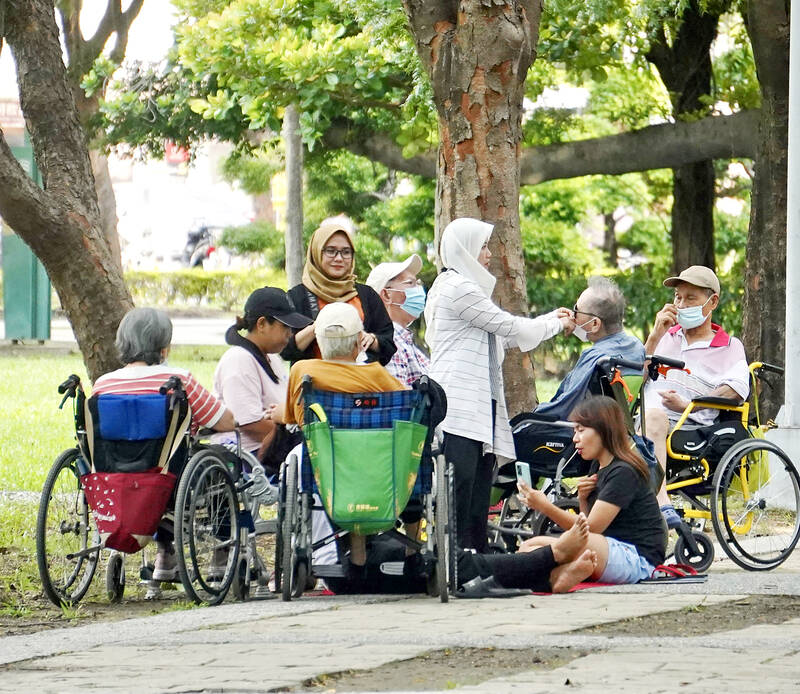Restrictions on hiring live-in caregivers from overseas are to be eased starting today, the Ministry of Labor said.
Some people who need full-time care would no longer have to undergo a functionality assessment using the Barthel Index to be eligible to hire foreign caregivers, the ministry said in a statement on Friday.
The Barthel Index measures a person’s ability to complete daily activities and is an important threshold regarding whether a family can hire a foreign caregiver.

Photo: CNA
From today, people who have had long-term care for at least six months and those who have been diagnosed with mild dementia would be exempt from Barthel Index requirements for hiring a foreign caregiver, the ministry said.
Until now, elderly and severely ill people were required to undergo a Barthel Index assessment conducted by a hospital if their family wanted to hire a foreign caregiver, with the exception of those categorized as having “specific disabilities.”
The category of “specific disabilities,” which includes people with significant physical or mental limitations, would be expanded to include people with mild physical disabilities, as well as people dealing with rare diseases, severe respiratory disorders or a loss of swallowing function.
People aged 75 or older who hold a disability certificate that is valid for an unlimited period and have already hired a foreign caregiver would be exempt from undergoing a Barthel Index assessment if their caregiver’s contract expires and they need a new caregiver.
Meanwhile, the ministry said that it would also be easing the rules covering the eligibility of migrant workers in some sectors to apply for “intermediate skilled worker” status.
Paul Su (蘇裕國), head of the Cross-Border Work-force Management Division under the ministry’s Workforce Development Agency, said that the new rules for workers would also be implemented from today.
Migrant workers had been required to work for the same employer for six consecutive years to become eligible for the program.
The easing of rules would allow migrant workers to apply for “intermediate skilled worker” status after working for the same employer for six cumulative years, even if they are not consecutive, the ministry said.

CHIPMAKING INVESTMENT: J.W. Kuo told legislators that Department of Investment Review approval would be needed were Washington to seek a TSMC board seat Minister of Economic Affairs J.W. Kuo (郭智輝) yesterday said he received information about a possible US government investment in Taiwan Semiconductor Manufacturing Co (TSMC, 台積電) and an assessment of the possible effect on the firm requires further discussion. If the US were to invest in TSMC, the plan would need to be reviewed by the Department of Investment Review, Kuo told reporters ahead of a hearing of the legislature’s Economics Committee. Kuo’s remarks came after US Secretary of Commerce Howard Lutnick on Tuesday said that the US government is looking into the federal government taking equity stakes in computer chip manufacturers that

NORTHERN STRIKE: Taiwanese military personnel have been training ‘in strategic and tactical battle operations’ in Michigan, a former US diplomat said More than 500 Taiwanese troops participated in this year’s Northern Strike military exercise held at Lake Michigan by the US, a Pentagon-run news outlet reported yesterday. The Michigan National Guard-sponsored drill involved 7,500 military personnel from 36 nations and territories around the world, the Stars and Stripes said. This year’s edition of Northern Strike, which concluded on Sunday, simulated a war in the Indo-Pacific region in a departure from its traditional European focus, it said. The change indicated a greater shift in the US armed forces’ attention to a potential conflict in Asia, it added. Citing a briefing by a Michigan National Guard senior

POWER PLANT POLL: The TPP said the number of ‘yes’ votes showed that the energy policy should be corrected, and the KMT said the result was a win for the people’s voice The government does not rule out advanced nuclear energy generation if it meets the government’s three prerequisites, President William Lai (賴清德) said last night after the number of votes in favor of restarting a nuclear power plant outnumbered the “no” votes in a referendum yesterday. The referendum failed to pass, despite getting more “yes” votes, as the Referendum Act (公民投票法) states that the vote would only pass if the votes in favor account for more than one-fourth of the total number of eligible voters and outnumber the opposing votes. Yesterday’s referendum question was: “Do you agree that the Ma-anshan Nuclear Power Plant

ENHANCED SECURITY: A Japanese report said that the MOU is about the sharing of information on foreign nationals entering Japan from Taiwan in the event of an emergency The Ministry of Foreign Affairs yesterday confirmed that Taiwan and Japan had signed an agreement to promote information exchanges and cooperation on border management, although it did not disclose more details on the pact. Ministry spokesman Hsiao Kuang-wei (蕭光偉) said the ministry is happy to see that the two nations continue to enhance cooperation on immigration control, in particular because Taiwan and Japan “share a deep friendship and frequent people-to-people exchanges.” “Last year, more than 7.32 million visits were made between the two countries, making it even more crucial for both sides to work closer on immigration and border control,” he said. Hsiao